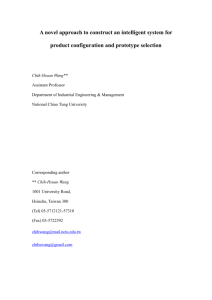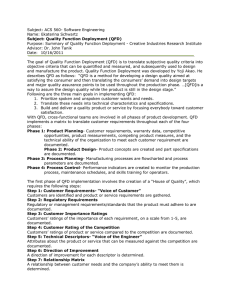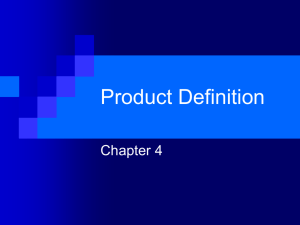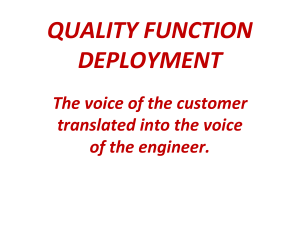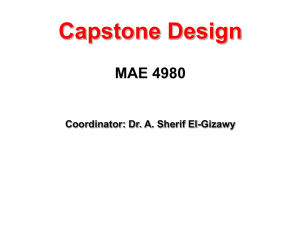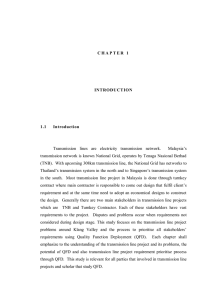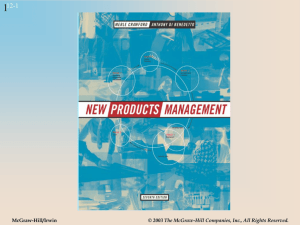quality function deployment with collabrative new
advertisement
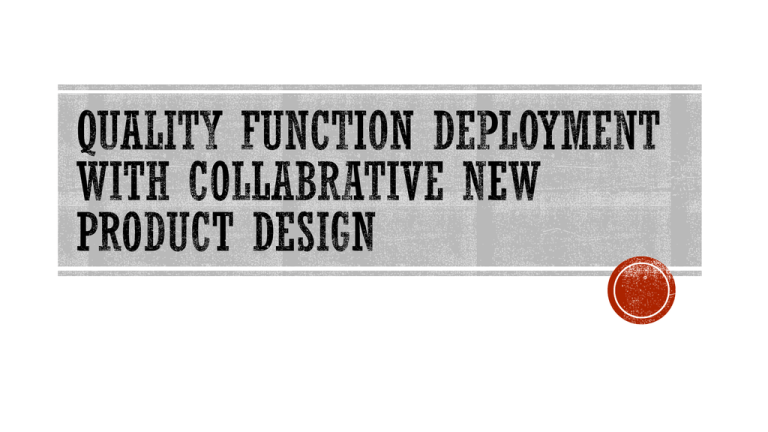
CONTENTS What is Quality Function Deployment? Application of Quality Function Deployment Benefits of Quality Function Deployment Phases of Quality Function Deployment The House of Quality Steps to the House of Quality Meaning and Examples: Voice of Customer Examples About House of Quality Quality Function Deployment is a quality development method which is used for new product design or improvement of existing product and at the same time. In order to stay in competitive market, the companies try new approaches and put the successful ones into application. One of the widely used approaches is, today, Quality Function Deployment (QFD). Prioritize spoken and unspoken customer wants and needs. Translate these needs into technical characteristics and specifications. Build and deliver a quality product or service by focusing everybody toward customer satisfaction. Plan new products Design product requirements Determine process characteristics Control the manufacturing process Document already existing product specifications It can be used for, a product, a new service available for a product for investment planning for process management technology-driven engineering even can be used for policy management Customer Deployement The focus is on customers wants, not what the company thinks the customer wants. The "Voice of the Customer" drives the development process. Competitive analysis Other products in the marketplace are examined, and the company product is rated against the competition. Reduced development time Careful attention to customer requirements reduces the risk that changes will be required late in the project life cycle. Time is not spent developing insignificant functions and features. Documentation A knowledge base is built as the QFD process is implemented. A historical record of the decision-making process is developed. Phase 1, Product Planning Phase 1, or product planning, is also called The House of Quality. Phase 2, Product Design Product design requires creativity and innovative team ideas. Phase 3, Process Planning: During process planning, manufacturing processes are flowcharted and process parameters (or target values) are documented. Phase 4, Process Control: In this phase decisions are made as to which process poses the most risk and controls are put in place to prevent failures. The House of Quality translates customer requirements, based on marketing research and benchmarking data, into an appropriate number of engineering targets to be met by a new product design. THE VOICE OF THE CUSTOMER’ The initial steps in forming the House of Quality include determining, clarifying, and specifying the customers’ needs. What do customers expect from clothes pin? TECHNICAL REQUIREMENTS: The next step of the QFD process is identifying what the customer wants and what must be achieved to satisfy these wants. In addition, regulatory standards and requirements dictated by management must be identified. Once all requirements are identified it is important to answer what must be done to the product design to fulfill the necessary requirements. PLANNING MATRIX: The planning matrix shows the weighted importance of each requirement that the team and its competitors are attempting to fulfill. Customer ratings, typically ranging from 1 to 5, are given to each company under each requirement. The customer ratings are combined with the weighted performance of each demand to produce an overall performance measure for the companies. INTERRELATIONSHIP MATRIX The main function of the interrelationship matrix is to establish a connection between the customer’s product requirements and the performance measures designed to improve the product. The team asks the question, "what is the strength of the relationship between the technical descriptors and the customers needs?" Relationships can either be weak, moderate, or strong and carry a numeric value of 1, 3 or 9. TECHNICAL CORRELATION MATRİX This room in the matrix is where the term House of Quality comes from because it makes the matrix look like a house with a roof. The correlation matrix is probably the least used room in the House of Quality; however, this room is a big help to the design engineers in the next phase of a comprehensive QFD project. Team members must examine how each of the technical descriptors impact each other. The team should document strong negative relationships between technical descriptors and work to eliminate physical contradictions. TECHNICAL PROPERTIES AND TARGETS: The technical properties matrix uses specific items to record the priorities assigned to technical requirements. It also provides a technical performance achieved by competitive products and the degree of difficulty in developing each requirement. CONCLUSION Through customer needs and competitive analysis, the House of Quality helps to identify the critical technical components that require change. VOICE OF THE CUSTOMER (VOC) The best proven methodology, for understanding what customer really wants is Voice of the Customer. QFD & CUSTOMER 1200W Hard Bonnet Hair Dryer (Individualization studies for commercial products) Infrared hair-drying lamp Considering new alternatives for conventional systems to develop new products or services. A research has been made in this study with people who are mostly employed and aged between 20 and 30. Considering the results of the research that has been made for potential customers, a new hairdryer product design can be based on the customer requirements. For example, a hairdryer which dries quickly is an important factor in the voice of customer and new hairdryer designs can be implemented with a new approach instead of making improvements on ordinary hairdryer designs. QFD AND THE NEW PRODUCT DEVELOPMENT PROCESS In a true quality system, we needed to address not only the quality of the products being designed and produced, but the quality of the new product development (NPD) process itself that creates those products. In other words, not just the quality of an assembly of parts, but the quality of the human activities needed to design and produce those parts human activities such as product planning, marketing, engineering, procurement, testing, manufacturing, packaging, after-sales support, etc. The quality function must be deployed across all the company. In product or process improvement activities such as kaizen , six sigma , etc. the focus is on existing products in production that fail to meet internal quality standards or fail in the field. This is definitely in the realm of the quality department to address. In new product development (NPD), however, there is no design, product, manufacturing process, and so forth yet, so it is unrealistic to wait until there is in order for the quality department to do its job. In NPD, quality must begin before design, when the business case is being developed that defines the scope and financial deliverables of the project, who the key customers are and how they are to be researched, what is the project timeline and what are the resource and budget constraints, etc. The only way quality can be assured is for organization functions to work together from the start. This is what is called cross-functional management (CFM) and it is one cornerstone of total quality management (TQM); QFD is the CFM system for assuring new NPD quality by deploying the quality function across the total organization. 1.An Automobile Bumper Customer Request: There is too much damage to bumpers in low-speed collisions. Customer wants a better bumper. Step 1: Identify Customer(s) Step 2: Determine Customer Requirements/Constraints I want something that looks Repair Department Automobile Owner Manufacturing Plant Sales Force nice (basic) It must hold my license plate (performance) I want it strong enough not to dent (excitement) It must protect my tail-lights and head-lights (performance) I don’t want to pay too much (basic) Step 3: Prioritize Customer Requirements PUT PRIORITIZED CUSTOMER REQUIREMENTS INTO A HOUSE OF QUALITY CHART Step 4: Competition Benchmarking Identify Competitors Test and Analyze Competitor Products Reverse Engineer Competitor Products Rate Competitor Products against customer requirements/constraints Put competitive benchmarking information into House of Quality Chart Requirements into Measurable Engineering Specifications and define target values Specify how license plate will be held Specify how to resist dents through material yield strength, young's modulus, etc. Specify with a dollar amount the term ‘inexpensive’ AN AUTOMOBIL BUMPER: Figure 1 shows an electrical appliance: an Ice-tea maker. We will use the QFD to study how to improve its design. The operation is as follows: Add tea leaves to the steeping basket, and cool water to the tank, and switch on the machine. The water from the tank enters the heating chamber, where an electrical coil boils it. The steam pushes the how water through a tube to the steeping basket. The hot water seeps through the tea leaves, and the tea drips down into the jar. Finally, the ice-tea is prepared by adding sugar, lemon, and ice to the tea in the jar, and mixing. Based on surveys, the customer requirements are identified; subsequent analysis of the surveys yields the relative importance. Based on the engineering analysis of the design, the corresponding technical features that must be modified are identified. Usually, for each customer requirement, there will be one or more technical feature. Now we proceed to the next steps: Benchmarking and analysis based on engineering and technical evaluations of what TP’s we can aim to modify by changing some design modules.The technical difficulty of each objective is assigned a numerical rating by the engineers who are in charge of the design of the modules related to this parameter. The team also consults each other to standardize their relative ratings. NOTES: 1)Technical difficulty values are relative numbers assigned by engineering teams 2)The right hand side shows comparison of consumer preferences to design of competing products. These numbers are relative, and based on statistics from customer surveys. 3)The ‘roof’ of the House is completed by identification of inter-related TP’s – there are four types of interrelationships of concern, these are described in the table below. Once the house is completely constructed, it provides a guideline for decisions on Which design features should be modified or upgraded first. If there is unlimited time and money, we would like to upgrade all the features that can be technically improved. However, this may not be the best strategy: A competitor may introduce a new product and capture some of the potential market while we are trying to improve our product. It may be better to provide sequential upgrades to tempt earlier users to buy a new machines once in every few time periods (for example, digital camera companies used this technique very effectively in the last few years). Thus, with budget and time constraints, the House of quality provides the design team with information to prioritize the important (in terms of customer demand) design changes.
